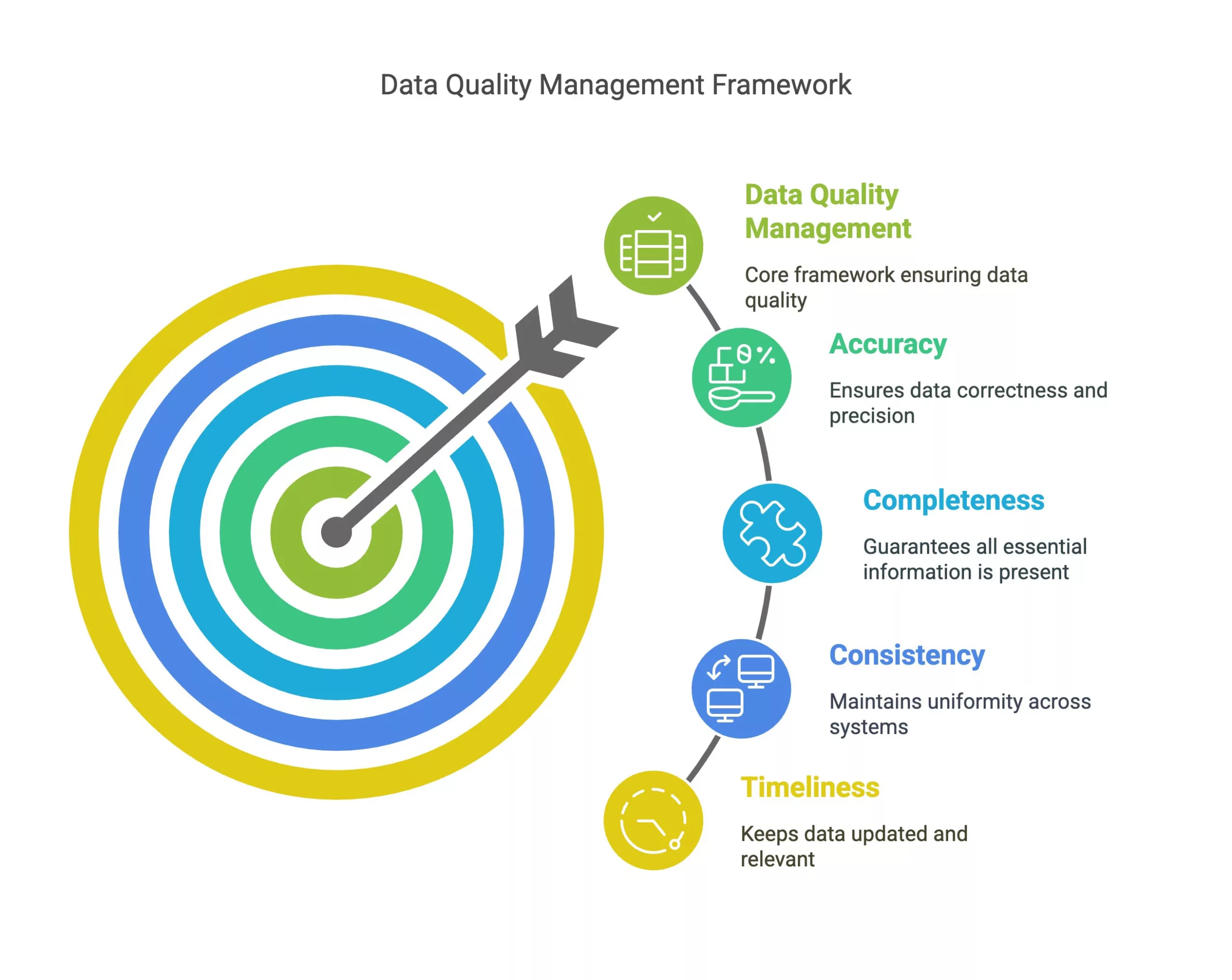Digital marketers are heavily investing in automation and personalization, convinced that technology alone can ensure success. Yet, behind every successful campaign, an invisible element makes all the difference: data quality. Without rigorous Data Quality Management, even the best strategies are doomed to fail. Exploding bounce rates, incorrect segmentation, wasted budgets, compromised regulatory compliance… The consequences of poor data management can be disastrous. What is DQM, why is it so important, and how can you ensure optimal data quality? That’s what we’ll explore in this article.
What is Data Quality Management?
Data Quality Management (DQM) encompasses all processes, tools, and methods that ensure the best possible quality of the data used by a company.
It is based on several key criteria:
Accuracy – Data must be correct and precise. A single error in an email or phone number can render communication ineffective.
Completeness – No essential information should be missing. For example, a blank “first name” field compromises personalization.
Consistency – Data must be uniform and synchronized across different systems (CRM, marketing tools, etc.).
Timeliness – A database should be regularly updated to prevent information obsolescence.

The Benefits of DQM
Superior Deliverability
A poorly maintained contact database harms the sender reputation. Sending messages to non-existent addresses increases your bounce rate, which can result in your emails being marked as spam. Conversely, good DQM reduces hard bounces and preserves your sender score.
Optimized Personalization and Segmentation
Sending the right message to the right person relies on accurate and reliable data. A clean database allows you to refine segmentation and tailor the tone and content of campaigns. Let’s take an example: an e-commerce site sends a birthday promo code to a customer, but the birth date is incorrect. The result? The message is not suitable, and the user experience is degraded.
However, effective DQM allows you to improve engagement and conversions.
Cost Reduction
Sending campaigns to incorrect, inactive, or duplicate contacts is a waste of budget. Poor data quality leads to unnecessary routing expenses and a diminished ROI, while DQM prevents losses.
Better Customer Relationship
The more precise and structured the data, the easier it is to understand customer expectations and interact with them. Basing communication on reliable information helps build customer trust and satisfaction.
Regulatory Compliance
The GDPR requires companies to maintain up-to-date databases and not store incorrect or obsolete information. Guidelines and standards that Data Quality Management ensures compliance with.
Data Quality Management: What It Takes for Effective Implementation
1) Regular Database Audits and Cleaning
Regular database audits (with Captain Verify) help identify and remove invalid or outdated email addresses with the appropriate tools.
It is also essential to identify and eliminate duplicates to avoid sending the same message multiple times to a contact.
Finally, contacts inactive for several months should be removed to maintain a dynamic and responsive database.
2) Data Standardization and Validation
Normalization (case sensitivity for first names, standardization of phone numbers, email addresses, etc.) is a key step in DQM.
Consider integrating validation controls directly into registration forms, such as automatic email address validation upon user entry. This prevents errors.
3) DQM Automation
Implementing an automatic verification process for new entries ensures consistent data quality.
Artificial intelligence algorithms can also be used to detect inconsistencies and anomalies in databases.
4) Training Marketing Teams
Training marketing teams on the importance of clean data is a fundamental part of good DQM.
It is also important to educate employees on best practices to avoid common mistakes and ensure a better use of databases.
In addition, adopting internal guides helps standardize data collection and maintenance processes.
The Essential Tools of Data Quality Management
To ensure effective data management, various solutions exist that can be combined:
Data Verification and Cleaning Tools
- Captain Verify – Real-time email and phone number verification.
- Google Cloud DQM – Database analysis and correction.
- Talend Data Quality – Advanced data quality management.
CRM Solutions with Integrated DQM
- Salesforce Data.com – Automatic contact updates.
- HubSpot CRM – Integrated marketing data management tools.
Artificial Intelligence Technologies for Data Analysis
- IBM InfoSphere QualityStage – Detection of anomalies and duplicates via AI.
- Trifacta Wrangler – Intelligent data cleaning and transformation.
If you see DQM as a technical constraint, it’s high time to change your perspective. Far from being secondary, the quality of your data is a sine qua non condition, a strategic lever influencing both the success of your marketing operations, your brand image, and your budget. Admit it, it’s well worth looking into!







